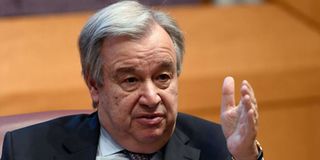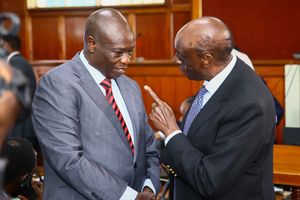Are women's rights advancing at the UN? A report card

United Nations Secretary-General Antonio Guterres says technology is playing a key role in gender equality reversals.
What you need to know:
- Enabling a feminist transformation for the Commission on the Status of Women and UN Women was rated D, the worst score.
- The grade for ensuring feminist implementation and accountability for the Sustainable Development Goals (SDGs) rests at C+.
Since the United Nations (UN) is a key proponent of gender mainstreaming, it is only fair that its performance on the same is evaluated.
This is partly what Time for feminist action and implementation: A report card on the Secretary-General’s fifth year from the Feminist UN Campaign (2022) does.
Developed by a coalition of leading activists for a more feminist UN system, the report grades António Guterres, the UN Secretary General (SG), against six themes set up by the Feminist UN Campaign. It gives the SG a B- for the 2021 period, a score derived from individual grades per theme.
Articulating and implementing a feminist leadership agenda attracts a B grade, based on fewer substantive references to gender equality in the SG’s speeches and his engagements with civil society in 2021 compared to 2020.
This indicates a low level of political commitment to “protecting and advancing women’s rights, reviewing the UN system’s capacity to deliver on gender equality, and a system-wide policy taking into account intersecting personal characteristics”.
The report highlights the lack of “an overall understanding of intersectionality and the existing power differentials in the UN system”. It, therefore, recommends integration of an “intersectional feminist approach in all UN policy and programming”.
SDGs
The grade for ensuring feminist implementation and accountability for the Sustainable Development Goals (SDGs) rests at C+. The report notes that despite commendable linkage of multiple UN initiatives, “the extent of calls for accountability and implementation” did not match the urgency needed to achieve the SDGs.
It, therefore, calls for greater advocacy by the SG for gender mainstreaming across all SDGs, with particular attention to the one on gender equality and women’s empowerment.
Financing for gender equality was graded C+, an average performance. On the positive side was “integration of gender in the Covid-19 Response and Recovery Fund…. and the Spotlight Initiative to Eliminate Violence Against Women and Girls”, as well as “commitment to applying the gender equality marker system to additional funds”.
Negative was opacity in the work of the High-Level Task Force on Financing for Gender Equality and relative muteness on the need for member states to increase contributions to UN Women.
On utilising feminist leadership through parity and rights protections, the SG scored B. The report decries “lack of a commitment to defining and implementing an agenda for racial and gender justice that considers the intersecting identities of UN staff and the people they are meant to serve”, as well as a lacklustre response to cases of sexual harassment, exploitation and abuse (SEA) in the system.
The campaign, therefore, urges him to improve the “availability and accessibility of information on parity initiatives” and to “centralise intersectionality in all UN policymaking and programming, and drive greater urgency to prevent and respond to SEA”.
Enabling a feminist transformation for the Commission on the Status of Women (CSW) and UN Women was rated D, the worst score.
The main reason for this was “the lack of transparency around the selection process for UN Women’s new Executive Director”, which sidelined contributions of civil society on the holder’s terms of reference.
The report makes an unequivocal demand that such future appointments should be “open and collaborative with civil society”.
Civil society engagement
It also calls on the SG to “expand his engagement with civil society at the CSW and to respond to their concerns about participation in the forum, especially virtually”. This verdict indicates that the SG has been rather cold towards civil society in the gender space.
Under promoting freedom of information in the UN system, the SG scored a B+. The report commends “increased efforts to promote access to data, resources and meetings/conferences …through virtual platforms”.
But it decries the deficient access to specific information, such as from the taskforce on financing for gender equality, which limits public engagement with UN leadership on key feminist issues. This hints at a deliberate strategy to avoid scrutiny and accountability.
The report has a rider that the evaluation is based on the Campaign’s agenda not the SG’s. This does not, however, minimise the importance of its findings, given that this is an accountability process and stakeholder-driven assessment of leadership.
The SG should, therefore, take it as an important mirror of his leadership around gender equality and absorb the recommendations for improvement in his second term, which ends in 2026.
Three things he must pay attention to are: increased funding for gender equality work and institutions; transparency in the taskforce dealing with the same; greater advocacy for gender equality and social inclusion; and relationships with civil society. This feedback is also a good indicator to future SGs on what feminist stakeholders expect of the UN and its leadership.
The writer is an international gender and development consultant and scholar ([email protected]).





